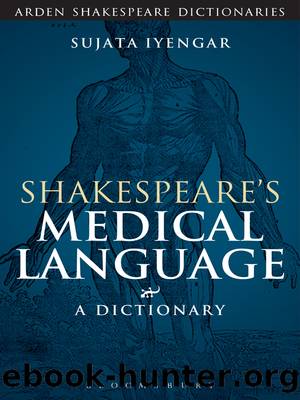Shakespeare's Medical Language: A Dictionary by Sujata Iyengar

Author:Sujata Iyengar
Language: eng
Format: epub
Publisher: Bloomsbury UK
Published: 2014-07-14T16:00:00+00:00
Imogen:
Fools are not mad folks.
Cloten:
Do you call me fool?
Imogen:
As I am mad, I do.
If you’ll be patient, I’ll no more be mad;
That cures us both.
(2.3.99–104)
Cloten again accuses Imogen of inappropriate lust, “madness,” to which she replies that she is not mad, but foolish—foolish to love against her father’s will, and foolish to bandy words with such as Cloten. When Cloten responds indignantly, however, she agrees that if she is mad, he is a fool for thinking so. If he can listen to her “patient[ly]” (with the pun on patient, or sufferer of illness, however, she can cure him by telling him downrightly that she cannot love him—indeed, she “hate[s]” him) (2.3.110). TNK exposes the susceptibility of lower-ranking women as well as the high-born to love-melancholy when the Jailer’s Daughter “run[s] mad” for Palamon (4.2.12). The play highlights her vulnerability to exploitation when the countrymen cry, “A madwoman! We are made, lads!” (3.5.76) and plan to exhibit “the dainty mad woman” (3.5.72) in their morris dance for profit. Shakespeare’s Venus becomes “mad” with love-sickness at the sight of Adonis’ dimples (249), with fear at the thought that Adonis is hurt (904), and ultimately curses all lovers with a love that hitherto shall be associated with madness: “[Love] shall be raging-mad and silly-mild, /Make the young old, the old become a child” (1151–2). Sonnet 140 describes just such a maddening love, pleading with the beloved to show kindness to the poet, even if only to humor him,
As testy sick men, when their deaths be near,
No news but health from their physicians know;
For if I should despair, I should grow mad,
And in my madness might speak ill of thee:
Now this ill-wresting world is grown so bad,
Mad slanderers by mad ears believed be,
That I may not be so, nor thou belied,
Bear thine eyes straight, though thy proud heart go wide.
Just as the physician attempts to make the last hours of a dying man peaceful by telling them (falsely) that they will recover, so he urges his love to give him hope. The absence of hope would breed despair, and despair would breed madness, and madness might make him malicious, and the world is now so corrupt that even “mad slanderers” such as the poet might prove convincing to “mad ears” of listeners.
(C) Barrough (1583) distinguishes among frenzy, mania, and madness, associating frenzy with a fever, and mania with too much blood flowing to the brain and causing immoderate laughter or, if mixed with choler, violent agitation. Jorden (1603) argued that the young woman Mary Glover suffered not from bewitchment but from physiological disorder in the body, namely “the suffocation of the mother” or hysterica passio. Harsnett (1603) likewise argues that only the gullible would trust an exorcist or Jesuit priest to treat madness, rather than relying on a physician to distinguish between natural and unnatural disorders of the mind and body. Nonetheless, in 1634 we find in Paré’s treatise “On Monsters and Prodigies” (in the English translation of his Complete Works) a conviction that
Download
This site does not store any files on its server. We only index and link to content provided by other sites. Please contact the content providers to delete copyright contents if any and email us, we'll remove relevant links or contents immediately.
Still Me by Jojo Moyes(11266)
On the Yard (New York Review Books Classics) by Braly Malcolm(5525)
A Year in the Merde by Stephen Clarke(5431)
Eleanor Oliphant Is Completely Fine by Gail Honeyman(5282)
The Bookshop by Penelope Fitzgerald(3854)
How Music Works by David Byrne(3272)
Surprise Me by Kinsella Sophie(3114)
Pharaoh by Wilbur Smith(2993)
Why I Write by George Orwell(2955)
A Column of Fire by Ken Follett(2614)
Churchill by Paul Johnson(2587)
The Beach by Alex Garland(2562)
The Songlines by Bruce Chatwin(2557)
Aubrey–Maturin 02 - [1803-04] - Post Captain by Patrick O'Brian(2306)
Heartless by Mary Balogh(2259)
Elizabeth by Philippa Jones(2206)
Hitler by Ian Kershaw(2199)
Life of Elizabeth I by Alison Weir(2086)
Harry Potter and the Cursed Child by J. K. Rowling & John Tiffany & Jack Thorne(2066)
